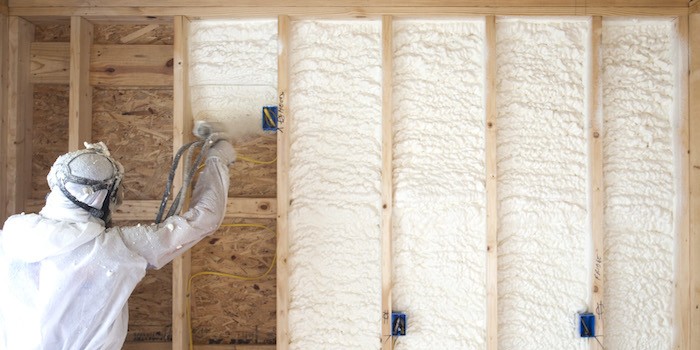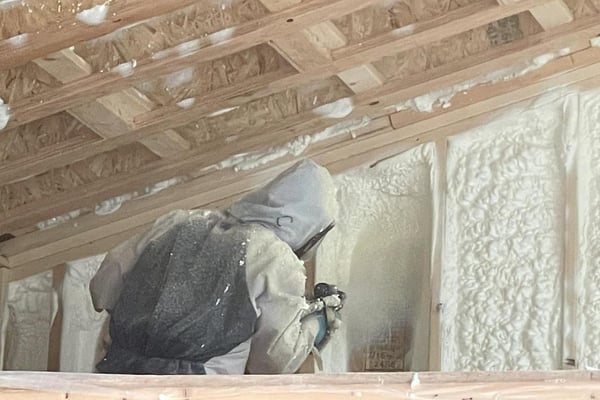Choosing the Right Type of Spray Foam for Your Insulation Needs
Top Factors to Pick Spray Foam for Your Following Insulation Job
When thinking about insulation options for your following project, spray foam sticks out as a result of its remarkable performance attributes and effectiveness benefits. Its remarkable R-value not only improves thermal resistance yet also adds to significant energy cost savings over time. Furthermore, the product's capacity to produce a closed seal effectively minimizes air infiltration and reduces the risk of moisture-related concerns, such as mold and mildew growth. As you evaluate your choices, exploring the functional applications and long-term advantages of spray foam might expose engaging reasons to incorporate it into your insulation method.
Superior Insulation Performance

The high R-value of spray foam, which gauges its thermal resistance, is another vital advantage. Closed-cell spray foam, for example, can achieve an R-value of as much as 6.5 per inch, substantially outshining fiberglass batts and cellulose. Spray foam insulation produces an airtight seal, which reduces thermal bridging and lowers the possibility for mold and mildew development due to moisture buildup.

Energy Performance Advantages
The energy effectiveness advantages of spray foam insulation are substantial, further enhancing its appeal as a leading option for developing insulation. Spray foam expands upon application, developing a closed seal that decreases air leakages, which is an usual resource of energy loss in conventional insulation materials.
Furthermore, spray foam insulation boasts a high R-value per inch, which means it offers more thermal resistance in much less space compared to choices like fiberglass or cellulose (Spray Foam). This performance not just adds to instant power cost savings yet additionally advertises lasting sustainability by minimizing the general power intake of a structure
Additionally, the application of spray foam can certify home owners for power effectiveness rewards and tax credit ratings, including financial advantages to its energy-saving capabilities. In a period where energy preservation is critical, choosing spray foam insulation not just enhances convenience however additionally aligns with ecologically responsible practices, making it a sensible selection for both household and commercial projects.
Moisture and Mold Resistance
Provided its distinct make-up and application technique, spray foam insulation offers remarkable dampness and mold resistance, making it a perfect selection for numerous settings. The closed-cell structure of spray foam creates a strong barrier that successfully seals prospective moisture access, therefore minimizing the likelihood of mold growth. Unlike standard insulation products, which can absorb water and provide a breeding place for mold and mildew, spray foam continues to be unsusceptible wetness, boosting the overall health and wellness of the interior setting.
Furthermore, the application process of spray foam includes increasing and filling spaces and fractures, guaranteeing a tight seal that lessens air leakages. This characteristic not just enhances power effectiveness check these guys out but also aids control humidity levels within the space. Proper moisture control is critical for avoiding mold and mildew and mildew, making spray foam insulation especially useful in locations susceptible to wetness, such as cellars and creep rooms.
In addition to its moisture-resistant properties, spray foam is likewise naturally immune to mold and mildew growth. This characteristic guarantees that structures and homes remain safe and healthy in time, offering satisfaction to house owners and building managers alike.
Long-Term Cost Savings
Spending in spray foam insulation yields considerable long-term cost financial savings, largely via improved power efficiency. Unlike conventional insulation materials, spray foam produces an impermeable seal that decreases air leak. This decrease in drafts results in reduce heating & cooling costs, as a/c systems do not have to work as difficult to maintain comfortable indoor temperatures.
In addition, the remarkable protecting properties of spray foam suggest that homes remain continually comfortable year-round, lowering reliance on energy-consuming devices. Over time, these savings can gather, leading to a visible reduction in utility costs.
Additionally, spray foam insulation contributes to the longevity of your home's structure by stopping moisture buildup and mold and mildew development, which can lead to pricey repairs. With its toughness and resistance her comment is here to resolving, spray foam preserves its efficiency over the years, making sure that the first financial investment remains to settle.
Fundamentally, choosing spray foam insulation not only enhances your home's energy efficiency yet additionally translates right into substantial long-term monetary benefits, making it a wise investment for house owners official site looking to reduce prices while boosting convenience and sustainability.
Versatile Application Choices
Numerous application choices make spray foam insulation a very flexible selection for a range of building jobs (Spray Foam). This adaptability allows it to be successfully made use of in household, business, and commercial settings, catering to diverse insulation needs
Spray foam can be used in attic rooms, wall surfaces, creep spaces, and even roof coverings, offering seamless insurance coverage that gets rid of spaces and spaces where air leakages frequently occur. Its capacity to increase upon application ensures a limited seal, which is important for energy performance and wetness control.
Moreover, spray foam insulation is offered in various formulations, consisting of open-cell and closed-cell types, enabling tailored solutions based on particular task demands. Open-cell foam is lighter and much better matched for soundproofing, while closed-cell foam uses exceptional insulation and architectural honesty, making it suitable for areas revealed to wetness.
On top of that, spray foam can be used in hard-to-reach spaces, improving its suitability for retrofitting existing frameworks. With the capability to stick to various substrates, including concrete, timber, and steel, spray foam insulation sticks out as a functional option that fulfills the needs of modern-day building practices.
Verdict
Finally, spray foam insulation becomes a superior choice for insulation tasks because of its extraordinary thermal resistance, power efficiency, and capacity to develop airtight seals that prevent dampness and mold development. The long-lasting price financial savings connected with reduced energy costs further improve its allure. In addition, its convenience in application across various setups underscores its usefulness and effectiveness. Selecting spray foam insulation makes certain a detailed option that fulfills the demands of modern building and energy efficiency standards.
When it comes to achieving optimal energy performance in residential and commercial buildings, spray foam insulation stands out for its exceptional insulation efficiency.The energy effectiveness benefits of spray foam insulation are significant, more improving its allure as a top choice for developing insulation.Investing in spray foam insulation yields substantial long-term cost financial savings, largely via improved power efficiency.In final thought, spray foam insulation emerges as a remarkable alternative for insulation jobs due to its phenomenal thermal resistance, energy efficiency, and ability to develop impermeable seals that avoid wetness and mold and mildew development. Choosing spray foam insulation makes certain an extensive option that meets the needs of modern building and construction and power performance standards.